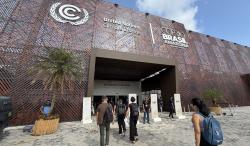Climate change is leading to increasingly frequent and severe extreme weather events, pandemics, and global instabilities, contributing to disrupted supply chains, economic downturns, and reduced food security. This demonstrates the impact of cascading shocks on the macroeconomy, vulnerable populations, and countries. Therefore, the main objective of ERA is to provide the government partners in Egypt and Thailand with a new generation of risk assessments for developing their climate change adaptation and, subsequently, their climate and disaster risk financing strategies.
To this end, the risk assessment tool CLIMADA will be expanded to i) analyze impacts on macroeconomic indicators (e.g., GDP, employment), ii) encompass different hazards and their monetary and non-monetary impacts (e.g., access to health and access to education), and iii) enable dynamic application by partner institutions. As part of an Economics of Climate Change (ECA) approach, the enhanced CLIMADA tool will then be piloted in Egypt and Thailand. The sector, hazards, and adaptation measures analyzed are to be decided together with local stakeholders and GIZ at the beginning of the project.





